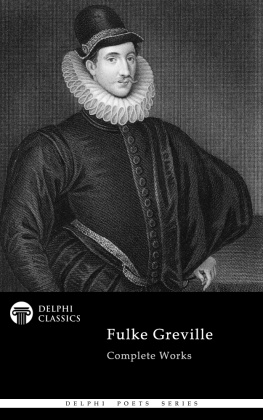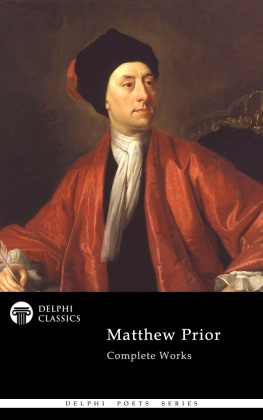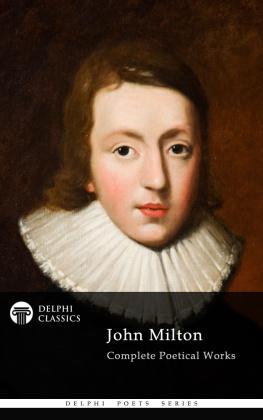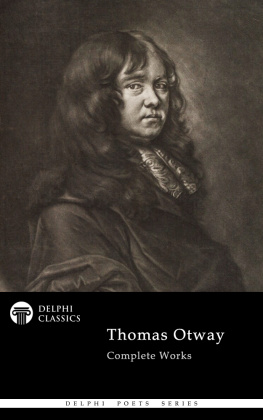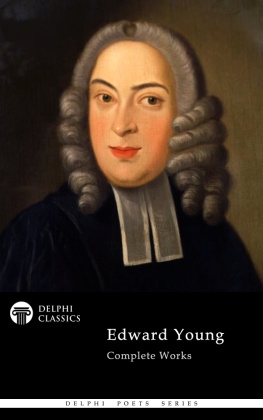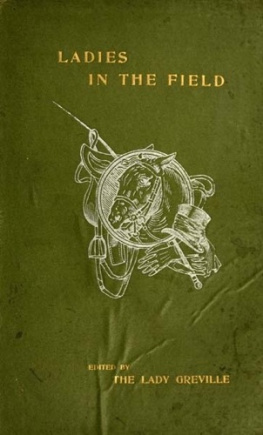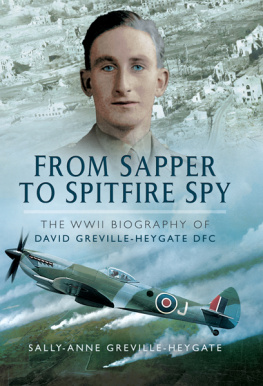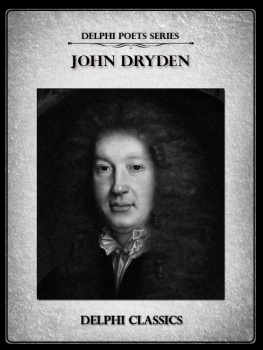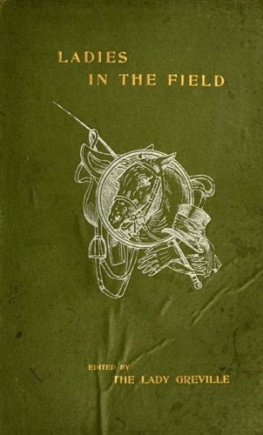

Fulke Greville
(1554-1628)

Contents

Delphi Classics 2021
Version 1









Browse the entire serie s


Explore Elizabethan and Jacobean Drama at Del phi Classics


Fulke Greville

By Delphi Classics, 2021
COPYRIGHT
Fulke Greville - Delphi Poets Series

First published in the United Kingdom in 2021 by Delphi Classics.
Delphi Classics, 2021.
All rights reserved. No part of this publication may be reproduced, stored in a retrieval system, or transmitted, in any form or by any means, without the prior permission in writing of the publisher, nor be otherwise circulated in any form other than that in which it is published.
ISBN: 978 1 80170 005 4
Delphi Classics
is an imprint of
Delphi Publishing Ltd
Hastings, East Sussex
United Kingdom
Contact: sales@delphiclassics.com

www.delphiclassics.com
NOTE

When reading poetry on an eReader, it is advisable to use a small font size and landscape mode, which will allow the lines of poetry to display correctly.
The Life and Poetry of Fulke Greville

Alcester, a market town of Roman origin at the junction of the River Alne and River Arrow in Warwickshire, approximately 8 miles west of Stratford-upon-Avon Greville was born at Beauchamp Court, near Alcester, in a moated manor house that no longer stands.
Brief Introduction: Fulke Greville

From 1911 Encyclopdia Britannica, Volume 4
FULKE GREVILLE BROOKE, 1st Baron (1554-1628), English poet, only son of Sir Fulke Greville, was born at Beauchamp Court, Warwickshire. He was sent in 1564, on the same day as his life-long friend, Philip Sidney, to Shrewsbury school. He matriculated at Jesus College, Cambridge, in 1568. Sir Henry Sidney, president of Wales, gave him in 1576 a post connected with the court of the Marches, but he resigned it in 1577 to go to court with Philip Sidney. Young Greville became a great favourite with Queen Elizabeth, who treated him with less than her usual caprice, but he was more than once disgraced for leaving the country against her wishes. Philip Sidney, Sir Edward Dyer and Greville were members of the Areopagus, the literary clique which, under the leadership of Gabriel Harvey, supported the introduction of classical metres into English verse. Sidney and Greville arranged to sail with Sir Francis Drake in 1585 in his expedition against the Spanish West Indies, but Elizabeth peremptorily forbade Drake to take them with him, and also refused Grevilles request to be allowed to join Leicesters army in the Netherlands. Philip Sidney, who took part in the campaign, was killed on the 17th of October 1586, and Greville shared with Dyer the legacy of his books, while in his Life of the Renowned Sir Philip Sidney he raised an enduring monument to his friends memory. About 1591 Greville served for a short time in Normandy under Henry of Navarre. This was his last experience of war. In 1583 he became secretary to the principality of Wales, and he represented Warwickshire in parliament in 1592-1593, 1597, 1601 and 1620. In 1598 he was made treasurer of the navy, and he retained the office through the early years of the reign of James I. In 1614 he became chancellor and under-treasurer of the exchequer, and throughout the reign he was a valued supporter of the kings party, although in 1615 he advocated the summoning of a parliament. In 1618 he became commissioner of the treasury, and in 1621 he was raised to the peerage with the title of Baron Brooke, a title which had belonged to the family of his paternal grandmother, Elizabeth Willoughby. He received from James I. the grant of Warwick Castle, in the restoration of which he is said to have spent 20,000. He died on the 30th of September 1628 in consequence of a wound inflicted by a servant who was disappointed at not being named in his masters will. Brooke was buried in St Marys church, Warwick, and on his tomb was inscribed the epitaph he had composed for himself: Folk Grevill Servant to Queene Elizabeth Conceller to King James Frend to Sir Philip Sidney. Trophaeum Peccati.
A rhyming elegy on Brooke, published in Huths Inedited Poetical Miscellanies , brings charges of extreme penuriousness against him, but of his generous treatment of contemporary writers there is abundant testimony. His only works published during his lifetime were four poems, one of which is the elegy on Sidney which appeared in The Phoenix Nest (1593), and the Tragedy of Mustapha . A volume of his works appeared in 1633, another of Remains in 1670, and his biography of Sidney in 1652. He wrote two tragedies on the Senecan model, Alaham and Mustapha . The scene of Alaham is laid in Ormuz. The development of the piece fully bears out the gloom of the prologue, in which the ghost of a former king of Ormuz reveals the magnitude of the curse about to descend on the doomed family. The theme of Mustapha is borrowed from Madeleine de Scudrys Ibrahim ou lillustre Bassa , and turns on the ambition of the sultana Rossa. The choruses of these plays are really philosophical dissertations, and the connexion with the rest of the drama is often very slight. In Mustapha , for instance, the third chorus is a dialogue between Time and Eternity, while the fifth consists of an invective against the evils of superstition, followed by a chorus of priests that does nothing to dispel the impression of scepticism contained in the first part. He tells us himself that the tragedies were not intended for the stage. Charles Lamb says they should rather be called political treatises. Of Brooke Lamb says, He is nine parts Machiavel and Tacitus, for one of Sophocles and Seneca.... Whether we look into his plays or his most passionate love-poems, we shall find all frozen and made rigid with intellect. He goes on to speak of the obscurity of expression that runs through all Brookes poetry, an obscurity which is, however, due more to the intensity and subtlety of the thought than to any lack of mere verbal lucidity.
Next page
